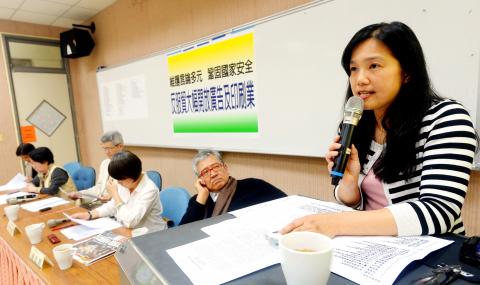More than 1,000 academics and workers in the cultural sector signed a petition launched by communication academics to protest against the cross-strait service trade agreement, which would allow Chinese investment in the nation’s printing and advertising industries.
The petition has garnered more than a thousand signatures within two days of its launch, with National Taiwan University’s Graduate Institute of Journalism director Hung Chen-ling (洪貞玲), National Chengchi University’s Department of Journalism chair Lin Yuan-huei (林元輝), National Taiwan Normal University’s Graduate Institute of Mass Communication director Kelly Hu (胡綺珍), National Chengchi University’s Department of Radio & Television chair Hsu Chiung-wen (許瓊文), Shih Hsin University’s Department of Journalism chair Hu Guang-shiash (胡光夏) and many professors from various universities’ communication-related departments among the petition’s initiators.
“As everybody knows, the media is directly and indirectly affected by the advertising industry, and freedom of speech is closely related to the publishing, printing, releasing and retailing industries,” Hung said at the press conference yesterday.

Photo: Lin Cheng-kung, Taipei Times
It is also common sense that the signing of a free-trade agreement should not pose risks to national security, she added.
“As cross-strait exchanges have become more frequent, a fact needs to be kept in mind: Taiwan and China are still to an extent adversaries, hostile to each other and therefore exchanges between the two can pose security risks,” the petition said.
“As China continues to be a (post-)authoritarian country that employs strict censorship and limits freedom of expression, a service trade pact that liberalizes Chinese investment in publishing-related industries without undertaking comprehensive assessments on the impact on Taiwan’s related industries and freedom of speech would detrimentally threaten Taiwan’s vibrant, plural, democratic and free environment,” it said.
One of the petition’s initiators is former Presidential Office national policy adviser Rex How (郝明義), who is also a publisher.
At the press conference, How criticized Minister of Culture Lung Ying-tai’s (龍應台) recent remarks about the pact not affecting the publishing industry because Chinese investment is “only allowed in the printing industry.”
“The relationship between printing, releasing, retailing and publishing as upstream and downstream industries can be paralleled to shoulders, arms, wrists and hands. Can you insist that your hands are not touched when your shoulders, arms and wrists have all been given away?” How asked.
Hu Yuan-hui (胡元輝), an associate professor at National Chung Cheng University’s Department of Communication, described the service trade pact as a “Faustian bargain,” saying that China’s influence on publishing-related industries was not aimed at economic gains, but at permeating every corner of the country with Chinese information.
Laurent Shen (沈志儒), creative director of Moulin-Orange (橘子磨坊), a company operating in the advertising industry, said that “Taiwan is not free anymore,” adding that in the signature collection campaign in support of the Sunflower movement within the industry, many working in the field were “only willing to support in private due pressure from you-know-what.”
He said Taiwan’s advertising industry is not afraid of international competition, but of “a liberalization and competition that forces the forfeiture of free consciousness.”

Chinese Nationalist Party (KMT) Chairman Eric Chu (朱立倫), spokeswoman Yang Chih-yu (楊智伃) and Legislator Hsieh Lung-chieh (謝龍介) would be summoned by police for questioning for leading an illegal assembly on Thursday evening last week, Minister of the Interior Liu Shyh-fang (劉世芳) said today. The three KMT officials led an assembly outside the Taipei City Prosecutors’ Office, a restricted area where public assembly is not allowed, protesting the questioning of several KMT staff and searches of KMT headquarters and offices in a recall petition forgery case. Chu, Yang and Hsieh are all suspected of contravening the Assembly and Parade Act (集會遊行法) by holding

PRAISE: Japanese visitor Takashi Kubota said the Taiwanese temple architecture images showcased in the AI Art Gallery were the most impressive displays he saw Taiwan does not have an official pavilion at the World Expo in Osaka, Japan, because of its diplomatic predicament, but the government-backed Tech World pavilion is drawing interest with its unique recreations of works by Taiwanese artists. The pavilion features an artificial intelligence (AI)-based art gallery showcasing works of famous Taiwanese artists from the Japanese colonial period using innovative technologies. Among its main simulated displays are Eastern gouache paintings by Chen Chin (陳進), Lin Yu-shan (林玉山) and Kuo Hsueh-hu (郭雪湖), who were the three young Taiwanese painters selected for the East Asian Painting exhibition in 1927. Gouache is a water-based

Taiwan would welcome the return of Honduras as a diplomatic ally if its next president decides to make such a move, Minister of Foreign Affairs Lin Chia-lung (林佳龍) said yesterday. “Of course, we would welcome Honduras if they want to restore diplomatic ties with Taiwan after their elections,” Lin said at a meeting of the legislature’s Foreign Affairs and National Defense Committee, when asked to comment on statements made by two of the three Honduran presidential candidates during the presidential campaign in the Central American country. Taiwan is paying close attention to the region as a whole in the wake of a

OFF-TARGET: More than 30,000 participants were expected to take part in the Games next month, but only 6,550 foreign and 19,400 Taiwanese athletes have registered Taipei city councilors yesterday blasted the organizers of next month’s World Masters Games over sudden timetable and venue changes, which they said have caused thousands of participants to back out of the international sporting event, among other organizational issues. They also cited visa delays and political interference by China as reasons many foreign athletes are requesting refunds for the event, to be held from May 17 to 30. Jointly organized by the Taipei and New Taipei City governments, the games have been rocked by numerous controversies since preparations began in 2020. Taipei City Councilor Lin Yen-feng (林延鳳) said yesterday that new measures by